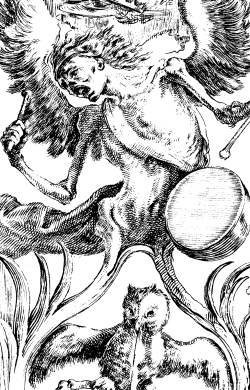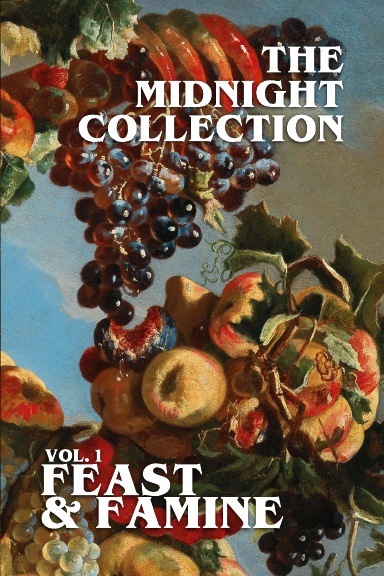When posting about The Midnight Collection, I’ve been hoping to see people’s opinions about the collection as a whole. But I can understand, slow times on FtB, not a lot of people ready to read a rando dark fiction collection at the drop of a hat. Well then, at the very least, curious to see people’s opinions about my own contributions. I’m going to post them here, one at a time. My posts are just going to have the start of the story with a link to where you can finish reading it on The Midnight Collection’s website. If you love or hate my story, or love expressing your opinion even when that is “meh,” leave a comment either here or there. My stories are quite different from each other, so if you hate this one, maybe the next will be more to your liking…

FOUR
Christopher Scott Shelton
Content Warnings: War, Mutilation, Death, Vomit, Disease, Gun Violence, etc.
The valley was cold, but the soldiers had fire.
They had battled all spring and summer. The spring rain, then the summer melt of mountain ice, had by turns rendered the plain into stinking mire, and the contribution of blood and rotting men was not insignificant.
Late summer dried the earth, late fall firmed it, and the fighting had at last thinned to nothing.
The valley was cold, but the men welcomed the firmness of the earth, the way it did not invade every inch of their clothing, bearing leeches, fleas, and maggots.
The valley was cold because the hot blood of men was no longer spilled upon it. So great had been the summer slaughter that the barricades and trenches were fortified with bone and dried flesh as much as earth.
And yet soldiers still lived there, with fire to warm them, hiding in a pit, feeding on rats and wild birds. The war had forgotten them, and they loved it. They missed bread but would not dare to give voice to complaint, lest they be heard by heralds and scouts and generals, sent to where flesh was still split for territory and ideology, for monarchy and for its enemies.
They quietly ate their rats and birds and contented themselves, until the day when a hussar appeared on a shining white horse with filthy black and grey hooves, his lance low and swinging as if to spear any dogs or beggars that he should chance upon.
The hussar wore a hat like the iron-plated prow of a warship, tall and narrow. His livery was drab green with faded silver buttons and braids layered thick as chain armor, his high boots a strange ivory suede besotted with the same grime as his steed’s hooves. They had both walked earth more pliant than the frozen pack of the soldiers’ shelter, of their wasted battlefield. He sneered through an orange moustache and rode by the men. They cringed away from that lance.
“Cowards, traitors, hiding in holes.” Was he Prussian? Belgian? None recognized his accent or uniform, but all sensed his authority.
“Nonesuch,” said the sergeant. “We were ordered to hold this field, and that is what we are doing.”
The hussar pivoted his mount expertly, and it pranced past the men again. “I suppose the war here is won, and the prize of that struggle is the peace you now enjoy? Yet elsewhere, men still try their valor. Elsewhere, men still suffer and die for what is right.”
“We answer to an officer of greater station within our army. Send one to us, if it pleases you.”
At the end, the horse stamped, turning in place but not walking their line again. Her master was stone in his saddle, unmoving despite her agitation, demonically resolute.
“Far be it from me to question their command. If you are to hold this field, then hold it.”
The hussar spurred his steed into a jump, traversing the trench in one motion. As he passed over the men, he split a saddle bag and something terrible splashed loose. They quailed away, and the foul substance splattered at their feet.
He rode away, and they beheld his strange offering. The bag had been filled with bilious vomit. What bizarre sort of man would have such a thing? The soldiers quickly buried it in whatever soil they could dislodge from the frozen firmament.
They had quickly buried it, yet the miasma somehow escaped that soil, tendrils creeping into men’s bodies in the night and day that followed. None were spared. Each in turn became vomitously ill, a few nigh unto death.
Throughout the ordeal, thoughts that had been carefully secreted away in their survivor reverie were at last given voice. Should they try to go home? Find another place to hide? To truly desert, where heretofore they had merely allowed themselves to be deserted?
The sergeant saw that the first men to fall ill were soon to recover, and with bitter scorn for the mad hussar, dismissed the idea he’d pose any further risk to them. He ordered the infantrymen to stay with him in the trench.
In truth, none were so hale as to seek an unnecessary march at that time, and they were relieved to have the decision of apathy made for them.
Anon, the hussar returned with a yet wealthier cavalier—a dragoon in deeply black wool with white silk appointments, riding a brilliantly red stallion. The high iron pot of his helmet was lacquered black, gleaming like a river under a crescent moon, topped with an outlandish silver crest. He was so heavily laden with swords that it would no doubt be more hindrance than help in combat—blades of every size and description—but his chief weapon was a long, heavy, and intricately carved cannon.
This dragoon spoke with a yet different foreign accent—was he Aragonese? Alsatian? “My brother spoke true. There are worms here, where once warriors drew arms. Sickening.” He was olive skinned with oiled black moustache and blood-red lips.
The hussar replied, “I would have said no such thing. The appearance of knavery is merely an appearance. Their sergeant spoke of a purpose in their repose.”
“Ah yes,” said the dragoon. “To hold the field. Can you hold this field, sergeant?”
In his anger, the sergeant gained some courage, but not so much as to stand up, expose his body to attack. His furious head peered from the trench like a badger backed into its burrow.
“I’ll not waste time in parlay with vagabonds in shiny suits. To precisely which army do you belong?”
A ball tore his head apart, having passed through the shoulder of another soldier on the way to its mark. Scraps of his face flapped in the air momentarily like a discarded orange peel, then his body slipped away. The dragoon had fired with perfect accuracy, despite taking no effort whatsoever in aiming. It had been truly fired from the hip.
The officer’s men all scrambled to load their fallow rifles, and end this terror before it could take them. But the dragoon stopped them with a single hand clapped on his own great cannon. They understood his meaning. The weapon had two barrels, and at least one of the soldiers would die in the effort.
Fear and fatigue broke their courage, and they let their arms rest. Nobody dared to speak—to take the place of their leader. The soldier with the wounded shoulder frantically tried to dress it, with no aid.
The dragoon calmly reloaded his spent barrel and still the soldiers did not try the same. “Good, good. That is discipline. It takes more courage to follow orders than it does to resist. For in resistance you risk some pain, a quick death, and in following your leaders, that pain need be endured a thousandfold.”
As he spoke, the hussar removed a saber from one of the many scabbards on the dragoon’s horse, and ran the blade through the stale vomit in his slashed saddlebag. He tossed the sword down where the soldiers could reach it, then drew another and did the same.
 “I’d like each of you to take up one of my swords. They are all quite strong and sharp, I assure you.” They still hesitated. “Take them up.”
“I’d like each of you to take up one of my swords. They are all quite strong and sharp, I assure you.” They still hesitated. “Take them up.”
He slapped his gun and the soldiers complied, each taking up a poisoned blade as soon as the hussar laid it down.
They were all so armed, emptying the dragoon’s supply. The trench was wide enough for two men to stand abreast, and as they looked at each other, they had a good idea of what was coming next.
“Without that mouthy sergeant, you count off a nice, even number. Face your nearest fellow and raise your guard…”
Or purchase the whole Midnight Collection e-book through Ko-fi or Amazon. A physical copy in paperback is available through Lulu. You may be able to purchase it through other sites soon, but it’s nice to not give Bezuggs a cut, and purchase on Lulu gives more money to the cause. And lastly, you can just read the collection for free at the Collection’s website.

Leave a Reply